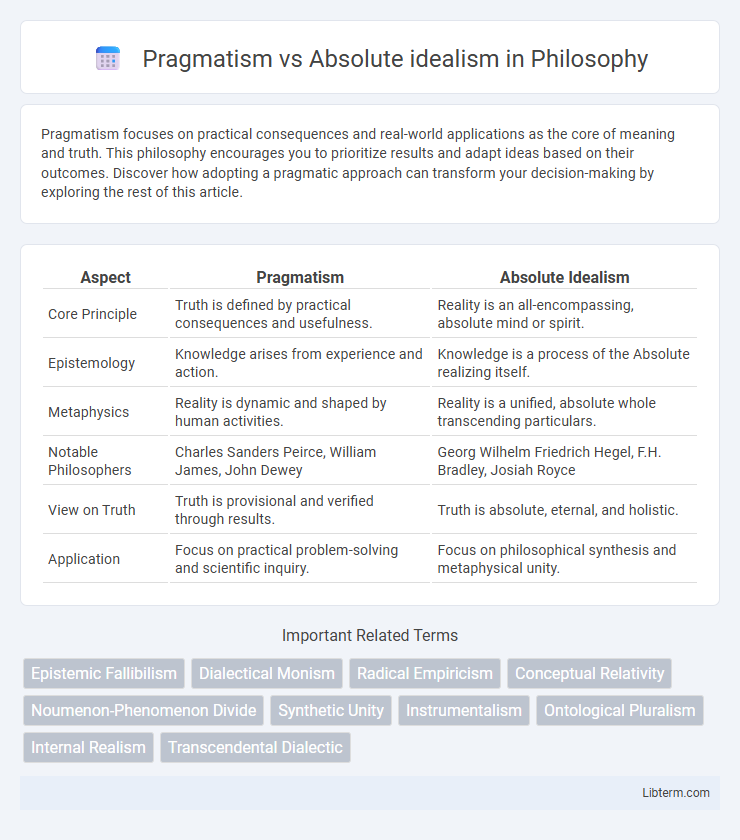Pragmatism focuses on practical consequences and real-world applications as the core of meaning and truth. This philosophy encourages you to prioritize results and adapt ideas based on their outcomes. Discover how adopting a pragmatic approach can transform your decision-making by exploring the rest of this article.
Table of Comparison
| Aspect | Pragmatism | Absolute Idealism |
|---|---|---|
| Core Principle | Truth is defined by practical consequences and usefulness. | Reality is an all-encompassing, absolute mind or spirit. |
| Epistemology | Knowledge arises from experience and action. | Knowledge is a process of the Absolute realizing itself. |
| Metaphysics | Reality is dynamic and shaped by human activities. | Reality is a unified, absolute whole transcending particulars. |
| Notable Philosophers | Charles Sanders Peirce, William James, John Dewey | Georg Wilhelm Friedrich Hegel, F.H. Bradley, Josiah Royce |
| View on Truth | Truth is provisional and verified through results. | Truth is absolute, eternal, and holistic. |
| Application | Focus on practical problem-solving and scientific inquiry. | Focus on philosophical synthesis and metaphysical unity. |
Introduction to Pragmatism and Absolute Idealism
Pragmatism centers on the practical consequences and real-world applications of ideas, emphasizing experience and action as key to understanding truth. Absolute Idealism, rooted in Hegelian philosophy, posits that reality is a coherent, all-encompassing unity of mind and spirit, asserting that truth is found in the absolute whole rather than isolated facts. These contrasting approaches highlight pragmatism's focus on empirical utility versus absolute idealism's metaphysical synthesis.
Historical Origins and Key Philosophers
Pragmatism originated in the late 19th century United States, primarily through the works of Charles Sanders Peirce, William James, and John Dewey, emphasizing practical consequences and experiential verification as the basis of meaning and truth. Absolute Idealism, rooted in German philosophy of the early 19th century, was principally developed by G.W.F. Hegel, who posited that reality is an all-encompassing absolute mind or spirit unfolding through dialectical processes. The historical development of Pragmatism responded to and contrasted with Absolute Idealism's focus on metaphysical totality by prioritizing concrete human experience and the practical function of ideas in resolving problems.
Core Principles of Pragmatism
Pragmatism centers on the principle that truth is validated through practical consequences and experiential outcomes, emphasizing action and utility over abstract theorizing. It holds that ideas and beliefs should be judged by their effectiveness in solving problems and guiding behavior, rather than by adherence to fixed, metaphysical absolutes. This contrasts with Absolute Idealism, which asserts that reality is a unified whole grasped through rational intuition and that truth is an immutable, absolute ideal beyond empirical verification.
Foundational Beliefs of Absolute Idealism
Absolute Idealism asserts that reality is fundamentally mental and that the universe is an interconnected whole shaped by an all-encompassing consciousness or spirit. It holds that individual minds and objects are manifestations of this ultimate, unified reality, emphasizing the primacy of ideas over material existence. This foundational belief contrasts with Pragmatism's focus on practical consequences and experiential verification as criteria for truth.
Methodological Differences: Practice vs. Theory
Pragmatism emphasizes practical experimentation and continuous adaptation as core methods, valuing outcomes and real-world applications over abstract formulations. Absolute idealism prioritizes a theoretical framework rooted in holistic concepts, seeking to understand reality as a coherent, unified whole through logical analysis. The methodological divergence lies in pragmatism's focus on action and consequences versus absolute idealism's reliance on ideal, conceptual synthesis.
Truth and Reality: Pragmatic Approach vs. Idealist Perspective
The pragmatic approach to truth emphasizes practical consequences and experiential verification, viewing reality as dynamic and constantly evolving through human interaction. In contrast, absolute idealism asserts that truth is an unchanging, absolute concept grounded in an all-encompassing, spiritual reality that transcends individual perception. Pragmatism prioritizes empirical outcomes and adaptability, while idealism stresses a unified metaphysical system where reality and truth are inherently interconnected and fixed.
Influence on Science, Ethics, and Society
Pragmatism, emphasizing practical outcomes and empirical evidence, has profoundly influenced scientific methodologies by promoting experimental validation and adaptable theories, fostering ethical frameworks centered on consequences and social utility. In contrast, Absolute Idealism, rooted in an absolute, often metaphysical, reality, has influenced science through holistic and integrative approaches, shaping ethical views that prioritize universal ideals and moral absolutes. Society under pragmatism tends toward progressive reform and flexibility, while Absolute Idealism underpins systems valuing coherence, unity, and enduring philosophical principles.
Criticisms and Counterarguments
Pragmatism faces criticism for its perceived relativism, as skeptics argue it undermines objective truth by valuing practical outcomes over fixed principles. In contrast, Absolute Idealism is challenged for its abstract, metaphysical nature, with critics contending it detaches thought from empirical reality and practical application. Counterarguments for pragmatism emphasize its flexibility and adaptability to real-world problems, while proponents of Absolute Idealism stress its comprehensive, unified vision of reality that integrates subject and object.
Contemporary Relevance and Applications
Pragmatism, emphasizing practical consequences and experiential learning, drives modern innovation and adaptive problem-solving in technology, education, and policy-making, whereas Absolute Idealism, with its focus on underlying realities and coherent systems, influences contemporary metaphysical and ethical debates. Pragmatism's relevance appears in iterative design processes and evidence-based decision-making, promoting flexibility in uncertain environments. Conversely, Absolute Idealism informs philosophical frameworks that seek to unify scientific knowledge with ethical imperatives in fields like cognitive science and social theory.
Conclusion: Comparative Insights and Future Directions
Pragmatism emphasizes practical outcomes and experience as the basis of truth, contrasting with Absolute Idealism's focus on an all-encompassing, unified reality shaped by consciousness. Comparative analysis reveals pragmatism's adaptability to scientific progress and social change while Absolute Idealism provides a comprehensive metaphysical framework that underscores interconnectedness. Future research may explore integrative models that combine pragmatism's empirical flexibility with idealism's ontological depth to address contemporary philosophical and epistemological challenges.
Pragmatism Infographic

 libterm.com
libterm.com